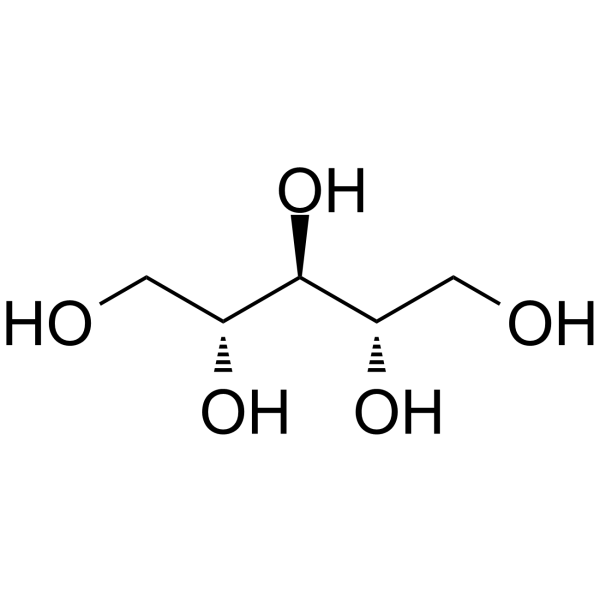天然产物 糖类和糖苷 Saccharides and Glycosides
Ribitol;(Synonyms: 核糖醇; Adonitol; Adonite) 纯度: ge;98.0%
Ribitol 是一种戊糖醇,可通过核糖还原形成。在酿酒酵母 (Saccharomyces cerevisiae) 中增强 D-葡萄糖转向戊糖磷酸途径,可用于生产 D-核糖和核糖醇。

Ribitol Chemical Structure
CAS No. : 488-81-3
| 规格 | 价格 | 是否有货 | 数量 |
|---|---|---|---|
| 10;mM;*;1 mL in Water | ¥550 | In-stock | |
| 500 mg | ¥500 | In-stock | |
| 1 g | ; | 询价 | ; |
| 5 g | ; | 询价 | ; |
* Please select Quantity before adding items.
Ribitol 相关产品
bull;相关化合物库:
- Natural Product Library Plus
- Bioactive Compound Library Plus
- Metabolism/Protease Compound Library
- Natural Product Library
- Human Endogenous Metabolite Compound Library
- Traditional Chinese Medicine Monomer Library
- Gut Microbial Metabolite Library
- Microbial Metabolite Library
- Food-Sourced Compound Library
- Rare Diseases Drug Library
| 生物活性 |
Ribitol is a crystalline pentose alcohol formed by the reduction of ribose. Enhancing the flux of D-glucose to the pentose phosphate pathway in Saccharomyces cerevisiae for the production of D-ribose and ribitol. |
||||||||||||||||
|---|---|---|---|---|---|---|---|---|---|---|---|---|---|---|---|---|---|
| IC50 Target |
|
||||||||||||||||
| 体外研究 (In Vitro) |
Ribitol is a reduced sugar[1]. Phosphoglucose isomerase-deficient (pgi1) strains of Saccharomyces cerevisiae are studied for the production of D-ribose and Ribitol from D-glucose via the intermediates of the pentose phosphate pathway. Overexpression of the gene encoding sugar phosphate phosphatase (DOG1) of S. cerevisiae is needed for the production of D-ribose and Ribitol. The engineered strains are compared for their ability to produce the PPP-derived 5-carbon compounds Ribitol and D-ribose from D-glucose[2]. MCE has not independently confirmed the accuracy of these methods. They are for reference only. |
||||||||||||||||
| 分子量 |
152.15 |
||||||||||||||||
| Formula |
C5H12O5 |
||||||||||||||||
| CAS 号 |
488-81-3 |
||||||||||||||||
| 中文名称 |
核糖醇;核醣醇;侧金盏花醇;戊五醇;侧金盏花醇;阿东糖醇 |
||||||||||||||||
| 运输条件 |
Room temperature in continental US; may vary elsewhere. |
||||||||||||||||
| 储存方式 |
|
||||||||||||||||
| 溶解性数据 |
In Vitro:;
H2O : 33.33 mg/mL (219.06 mM; Need ultrasonic) DMSO : 1.1 mg/mL (7.23 mM; Need ultrasonic) 配制储备液
*
请根据产品在不同溶剂中的溶解度选择合适的溶剂配制储备液;一旦配成溶液,请分装保存,避免反复冻融造成的产品失效。 |
||||||||||||||||
| 参考文献 |
|
| Kinase Assay [2] |
The high-performance liquid chromatography (HPLC) analyses are carried out using a Fast Acid Column (100×7.8 mm) and a HPX-87H Ion Exclusion Column (300 mm×7.8 mm) in series with 2.5 mM H2SO4 in water as the mobile phase at a flow rate of 0.3 mL/min, at 55°C. This method enabled quantification of D-glucose, ethanol, glycerol, D-xylulose, Ribitol, and xylitol. D-ribose, D-ribulose, and D-arabitol coeluted on the Aminex HPX-87H column. The CarboPac MA-1 column of Dionex ICS-3000 is used to analyze representative culture supernatant samples for the presence of arabitol and xylitol. Samples are run at column temperature of 30°C with 480 mM NaOH at flow rate 0.4 mL/min. The CarboPac MA-1 column separated D-arabitol from D-ribose and D-ribulose, but the alkaline conditions degraded D-ribulose interfering with the quantification of D-ribose.Yeast cells are disrupted with glass beads in 100 mM sodium phosphate buffer pH 7.0 containing phenylmethylsulfonyl fluoride and pepstatin A in final concentrations of 0.17 mg/mL and 0.01 mg/mL, respectively.The activity of NAD+-dependent Gdh2p is measured in a reaction buffer of 0.5 M triethanol amine pH 7.7 and 2 mM NADH. After addition of the cell lysate, the reaction is started by adding a mixture of α-ketoglutarate (100 mM) and NH4Cl (200 mM) to a final concentration of 2.4 mM and 4.9 mM, respectively. The GapB activity is measured. Shortly, the reaction mixture is 500 mM triethanol amine pH 7.8, 1 mM ATP, 2 mM MgCl2, 200 μM NADPH, and 10 μg/mL of phosphoglycerate kinase. 3-phosphoglycerate is added to a final concentration of 5 mM to start the reaction. Activity measurements are performed with a Cobas Mira Plus automated analyzer[2]. MCE has not independently confirmed the accuracy of these methods. They are for reference only. |
|---|---|
| 参考文献 |
|
